Critical Evaluation: Organisational Learning and Learning Organisation
VerifiedAdded on 2022/12/26
|11
|3121
|438
Report
AI Summary
This report critically evaluates the differences between organisational learning and a learning organisation. It begins by defining learning and development and then explores organisational learning, covering its theory, importance, models (single, double, and deutero loops), advantages, and disadvantages. The report then defines a learning organisation, detailing its features (collaboration, information sharing, culture, teams, shared vision), advantages, and disadvantages. Finally, the report examines the relationship and key differences between the two concepts, providing a comprehensive overview of how organizations can foster continuous learning and development. The report draws on academic sources and provides a critical analysis of the literature, adhering to Harvard referencing. The report's structure follows the assignment brief, including an introduction, main body, conclusion, and references. This report aims to equip students with a comprehensive understanding of the key concepts of organisational learning and learning organisations, making it a valuable resource for those studying leadership management.
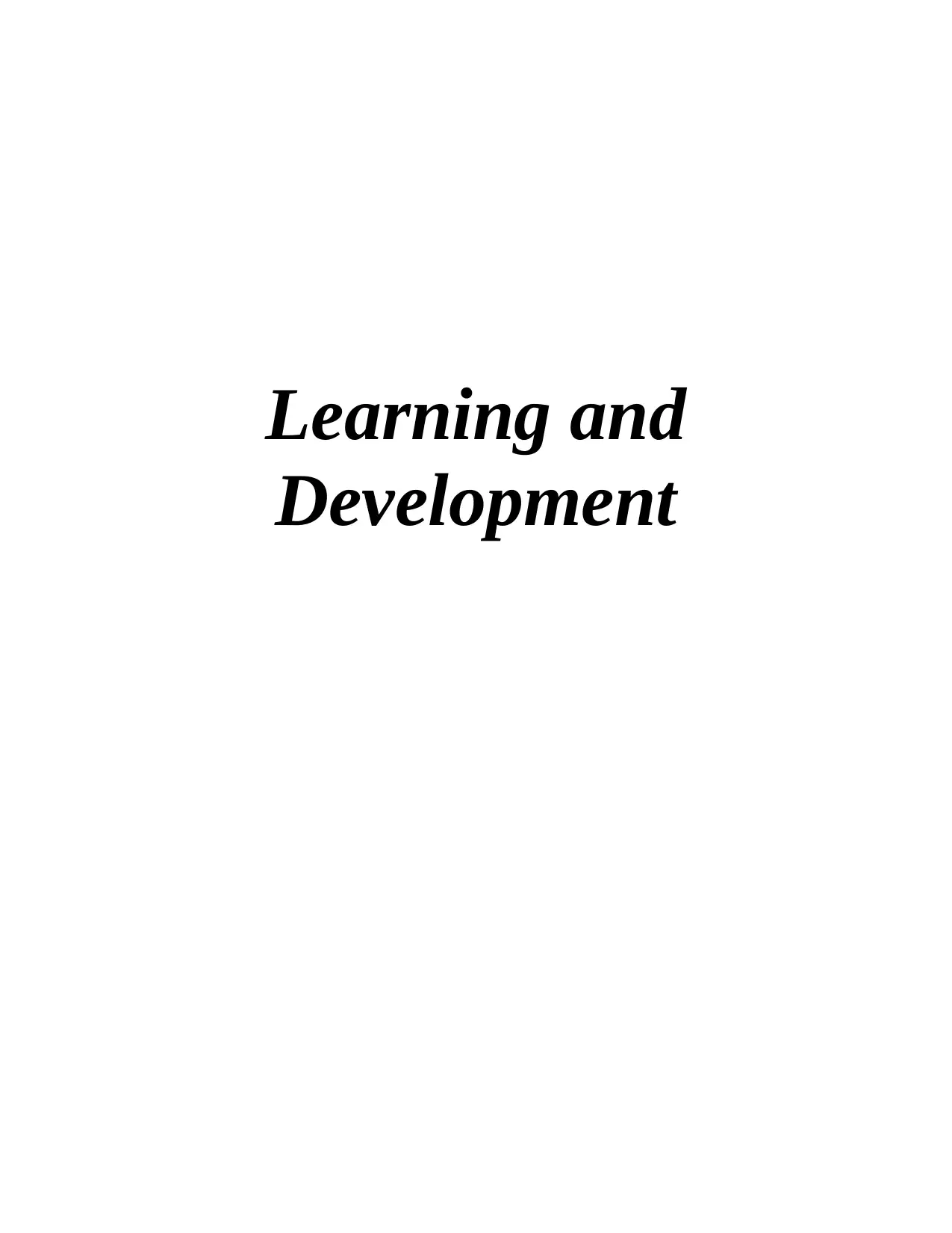
Learning and
Development
Development
Paraphrase This Document
Need a fresh take? Get an instant paraphrase of this document with our AI Paraphraser

Table of Contents
INTRODUCTION ..........................................................................................................................3
MAIN BODY...................................................................................................................................3
Organisational Learning..............................................................................................................3
Organisational Learning Theory.................................................................................................3
Importance of Organisational Learning......................................................................................4
Organisational learning Model....................................................................................................5
Advantages of Organisational Learning......................................................................................5
Disadvantages of Organisational Learning.................................................................................6
Learning Organisation.................................................................................................................6
Features of Learning Organisation..............................................................................................6
Advantages of Learning Organisation........................................................................................7
Disadvantages of learning organisation .....................................................................................8
Relationship between Organisational Learning and Learning Organisation..............................8
Difference between Organisational Learning and Learning Organisation..................................9
CONCLUSION .............................................................................................................................10
REFERENCES..............................................................................................................................11
INTRODUCTION ..........................................................................................................................3
MAIN BODY...................................................................................................................................3
Organisational Learning..............................................................................................................3
Organisational Learning Theory.................................................................................................3
Importance of Organisational Learning......................................................................................4
Organisational learning Model....................................................................................................5
Advantages of Organisational Learning......................................................................................5
Disadvantages of Organisational Learning.................................................................................6
Learning Organisation.................................................................................................................6
Features of Learning Organisation..............................................................................................6
Advantages of Learning Organisation........................................................................................7
Disadvantages of learning organisation .....................................................................................8
Relationship between Organisational Learning and Learning Organisation..............................8
Difference between Organisational Learning and Learning Organisation..................................9
CONCLUSION .............................................................................................................................10
REFERENCES..............................................................................................................................11
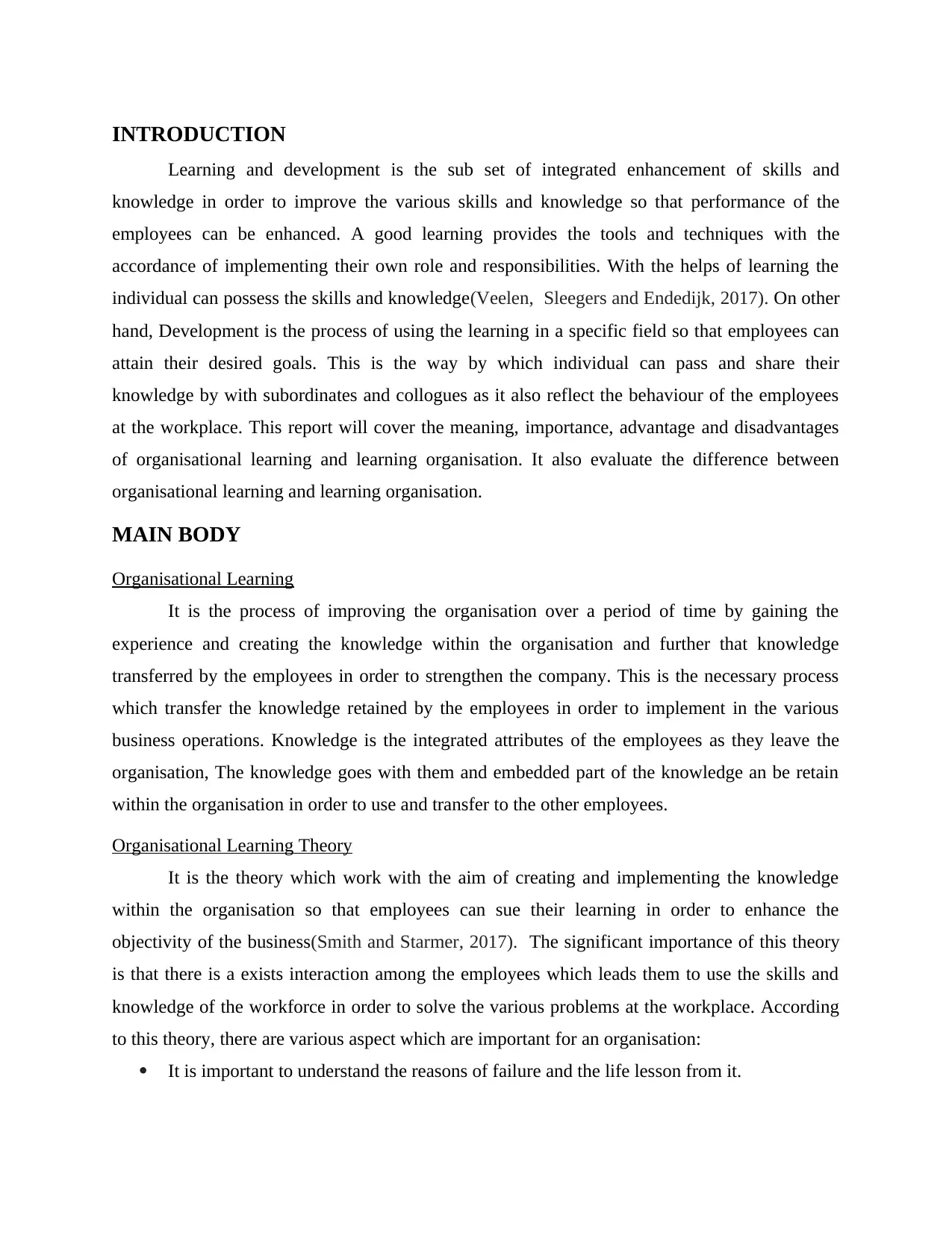
INTRODUCTION
Learning and development is the sub set of integrated enhancement of skills and
knowledge in order to improve the various skills and knowledge so that performance of the
employees can be enhanced. A good learning provides the tools and techniques with the
accordance of implementing their own role and responsibilities. With the helps of learning the
individual can possess the skills and knowledge(Veelen, Sleegers and Endedijk, 2017). On other
hand, Development is the process of using the learning in a specific field so that employees can
attain their desired goals. This is the way by which individual can pass and share their
knowledge by with subordinates and collogues as it also reflect the behaviour of the employees
at the workplace. This report will cover the meaning, importance, advantage and disadvantages
of organisational learning and learning organisation. It also evaluate the difference between
organisational learning and learning organisation.
MAIN BODY
Organisational Learning
It is the process of improving the organisation over a period of time by gaining the
experience and creating the knowledge within the organisation and further that knowledge
transferred by the employees in order to strengthen the company. This is the necessary process
which transfer the knowledge retained by the employees in order to implement in the various
business operations. Knowledge is the integrated attributes of the employees as they leave the
organisation, The knowledge goes with them and embedded part of the knowledge an be retain
within the organisation in order to use and transfer to the other employees.
Organisational Learning Theory
It is the theory which work with the aim of creating and implementing the knowledge
within the organisation so that employees can sue their learning in order to enhance the
objectivity of the business(Smith and Starmer, 2017). The significant importance of this theory
is that there is a exists interaction among the employees which leads them to use the skills and
knowledge of the workforce in order to solve the various problems at the workplace. According
to this theory, there are various aspect which are important for an organisation:
It is important to understand the reasons of failure and the life lesson from it.
Learning and development is the sub set of integrated enhancement of skills and
knowledge in order to improve the various skills and knowledge so that performance of the
employees can be enhanced. A good learning provides the tools and techniques with the
accordance of implementing their own role and responsibilities. With the helps of learning the
individual can possess the skills and knowledge(Veelen, Sleegers and Endedijk, 2017). On other
hand, Development is the process of using the learning in a specific field so that employees can
attain their desired goals. This is the way by which individual can pass and share their
knowledge by with subordinates and collogues as it also reflect the behaviour of the employees
at the workplace. This report will cover the meaning, importance, advantage and disadvantages
of organisational learning and learning organisation. It also evaluate the difference between
organisational learning and learning organisation.
MAIN BODY
Organisational Learning
It is the process of improving the organisation over a period of time by gaining the
experience and creating the knowledge within the organisation and further that knowledge
transferred by the employees in order to strengthen the company. This is the necessary process
which transfer the knowledge retained by the employees in order to implement in the various
business operations. Knowledge is the integrated attributes of the employees as they leave the
organisation, The knowledge goes with them and embedded part of the knowledge an be retain
within the organisation in order to use and transfer to the other employees.
Organisational Learning Theory
It is the theory which work with the aim of creating and implementing the knowledge
within the organisation so that employees can sue their learning in order to enhance the
objectivity of the business(Smith and Starmer, 2017). The significant importance of this theory
is that there is a exists interaction among the employees which leads them to use the skills and
knowledge of the workforce in order to solve the various problems at the workplace. According
to this theory, there are various aspect which are important for an organisation:
It is important to understand the reasons of failure and the life lesson from it.
⊘ This is a preview!⊘
Do you want full access?
Subscribe today to unlock all pages.

Trusted by 1+ million students worldwide
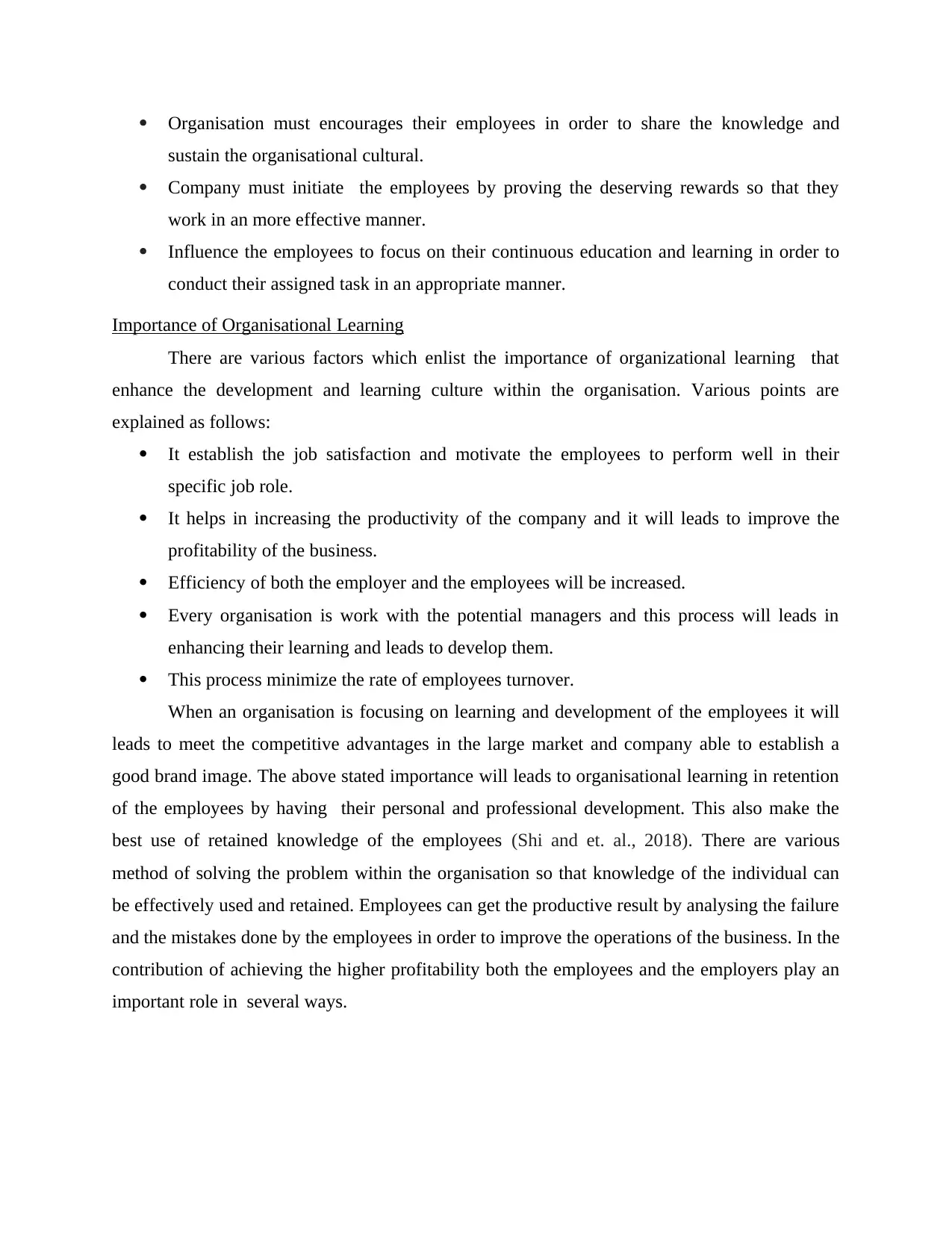
Organisation must encourages their employees in order to share the knowledge and
sustain the organisational cultural.
Company must initiate the employees by proving the deserving rewards so that they
work in an more effective manner.
Influence the employees to focus on their continuous education and learning in order to
conduct their assigned task in an appropriate manner.
Importance of Organisational Learning
There are various factors which enlist the importance of organizational learning that
enhance the development and learning culture within the organisation. Various points are
explained as follows:
It establish the job satisfaction and motivate the employees to perform well in their
specific job role.
It helps in increasing the productivity of the company and it will leads to improve the
profitability of the business.
Efficiency of both the employer and the employees will be increased.
Every organisation is work with the potential managers and this process will leads in
enhancing their learning and leads to develop them.
This process minimize the rate of employees turnover.
When an organisation is focusing on learning and development of the employees it will
leads to meet the competitive advantages in the large market and company able to establish a
good brand image. The above stated importance will leads to organisational learning in retention
of the employees by having their personal and professional development. This also make the
best use of retained knowledge of the employees (Shi and et. al., 2018). There are various
method of solving the problem within the organisation so that knowledge of the individual can
be effectively used and retained. Employees can get the productive result by analysing the failure
and the mistakes done by the employees in order to improve the operations of the business. In the
contribution of achieving the higher profitability both the employees and the employers play an
important role in several ways.
sustain the organisational cultural.
Company must initiate the employees by proving the deserving rewards so that they
work in an more effective manner.
Influence the employees to focus on their continuous education and learning in order to
conduct their assigned task in an appropriate manner.
Importance of Organisational Learning
There are various factors which enlist the importance of organizational learning that
enhance the development and learning culture within the organisation. Various points are
explained as follows:
It establish the job satisfaction and motivate the employees to perform well in their
specific job role.
It helps in increasing the productivity of the company and it will leads to improve the
profitability of the business.
Efficiency of both the employer and the employees will be increased.
Every organisation is work with the potential managers and this process will leads in
enhancing their learning and leads to develop them.
This process minimize the rate of employees turnover.
When an organisation is focusing on learning and development of the employees it will
leads to meet the competitive advantages in the large market and company able to establish a
good brand image. The above stated importance will leads to organisational learning in retention
of the employees by having their personal and professional development. This also make the
best use of retained knowledge of the employees (Shi and et. al., 2018). There are various
method of solving the problem within the organisation so that knowledge of the individual can
be effectively used and retained. Employees can get the productive result by analysing the failure
and the mistakes done by the employees in order to improve the operations of the business. In the
contribution of achieving the higher profitability both the employees and the employers play an
important role in several ways.
Paraphrase This Document
Need a fresh take? Get an instant paraphrase of this document with our AI Paraphraser
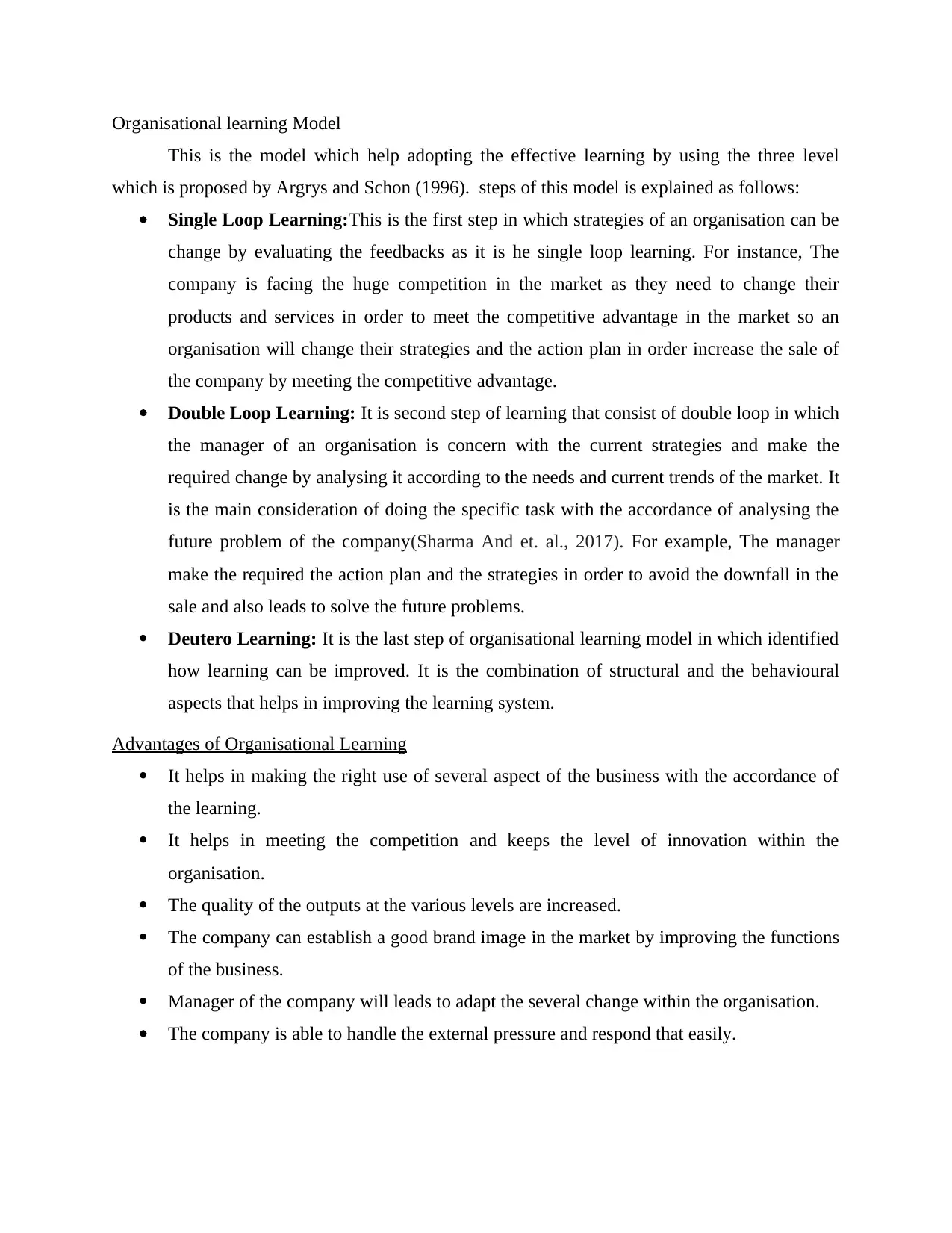
Organisational learning Model
This is the model which help adopting the effective learning by using the three level
which is proposed by Argrys and Schon (1996). steps of this model is explained as follows:
Single Loop Learning:This is the first step in which strategies of an organisation can be
change by evaluating the feedbacks as it is he single loop learning. For instance, The
company is facing the huge competition in the market as they need to change their
products and services in order to meet the competitive advantage in the market so an
organisation will change their strategies and the action plan in order increase the sale of
the company by meeting the competitive advantage.
Double Loop Learning: It is second step of learning that consist of double loop in which
the manager of an organisation is concern with the current strategies and make the
required change by analysing it according to the needs and current trends of the market. It
is the main consideration of doing the specific task with the accordance of analysing the
future problem of the company(Sharma And et. al., 2017). For example, The manager
make the required the action plan and the strategies in order to avoid the downfall in the
sale and also leads to solve the future problems.
Deutero Learning: It is the last step of organisational learning model in which identified
how learning can be improved. It is the combination of structural and the behavioural
aspects that helps in improving the learning system.
Advantages of Organisational Learning
It helps in making the right use of several aspect of the business with the accordance of
the learning.
It helps in meeting the competition and keeps the level of innovation within the
organisation.
The quality of the outputs at the various levels are increased.
The company can establish a good brand image in the market by improving the functions
of the business.
Manager of the company will leads to adapt the several change within the organisation.
The company is able to handle the external pressure and respond that easily.
This is the model which help adopting the effective learning by using the three level
which is proposed by Argrys and Schon (1996). steps of this model is explained as follows:
Single Loop Learning:This is the first step in which strategies of an organisation can be
change by evaluating the feedbacks as it is he single loop learning. For instance, The
company is facing the huge competition in the market as they need to change their
products and services in order to meet the competitive advantage in the market so an
organisation will change their strategies and the action plan in order increase the sale of
the company by meeting the competitive advantage.
Double Loop Learning: It is second step of learning that consist of double loop in which
the manager of an organisation is concern with the current strategies and make the
required change by analysing it according to the needs and current trends of the market. It
is the main consideration of doing the specific task with the accordance of analysing the
future problem of the company(Sharma And et. al., 2017). For example, The manager
make the required the action plan and the strategies in order to avoid the downfall in the
sale and also leads to solve the future problems.
Deutero Learning: It is the last step of organisational learning model in which identified
how learning can be improved. It is the combination of structural and the behavioural
aspects that helps in improving the learning system.
Advantages of Organisational Learning
It helps in making the right use of several aspect of the business with the accordance of
the learning.
It helps in meeting the competition and keeps the level of innovation within the
organisation.
The quality of the outputs at the various levels are increased.
The company can establish a good brand image in the market by improving the functions
of the business.
Manager of the company will leads to adapt the several change within the organisation.
The company is able to handle the external pressure and respond that easily.

Disadvantages of Organisational Learning
This will leads to exploit the balance of an organisation.
It is the temporary in nature which help in making the right use of all the aspect in the
business.
It is considered as the trap for the company with the integration of several competency.
Learning Organisation
It is the aspect which operates their business in a dynamic environment as these are the
firms which already implement the strategies that develop the company for continuous learning
with the consideration of adopting and making the required change(Shao, Feng and Wang,
2017). As the increasing globalization, It is important to adopt the several change within the
organisation so that they can identify the needs and demand of the potential customers with the
aim of generating high profits.
It is important to have the change adoptive behaviour so that company can easily
implement the change in order to meet the competition in the large market. It is important to
have the several change in the market so that they can make the best use of several strategies in
order to meet the huge competition. There are various factors which focuses on learning
organisation is explained as follows:
It helps in adopting the programs which is involved in the continuous learning.
This initiate the employees to give challenge and give the suggestions in accordance of
the current working of an organisation(Shakhovska, Vysotska and Chyrun, 2017).
This will leads to use the various business strategies in accordance to solve the various
problems in an systematic manner.
With the aim of training the employees they transfer the knowledge that is retained
within the employees.
Features of Learning Organisation
Collaboration: It is the process of relating the several aspect of the business so that task
can be done in an appropriate manner. The strong minded managers communicate with
the employees and support each other in perform their specific job role in such a manner
so that they can achieve the business goal in an effective manner.
This will leads to exploit the balance of an organisation.
It is the temporary in nature which help in making the right use of all the aspect in the
business.
It is considered as the trap for the company with the integration of several competency.
Learning Organisation
It is the aspect which operates their business in a dynamic environment as these are the
firms which already implement the strategies that develop the company for continuous learning
with the consideration of adopting and making the required change(Shao, Feng and Wang,
2017). As the increasing globalization, It is important to adopt the several change within the
organisation so that they can identify the needs and demand of the potential customers with the
aim of generating high profits.
It is important to have the change adoptive behaviour so that company can easily
implement the change in order to meet the competition in the large market. It is important to
have the several change in the market so that they can make the best use of several strategies in
order to meet the huge competition. There are various factors which focuses on learning
organisation is explained as follows:
It helps in adopting the programs which is involved in the continuous learning.
This initiate the employees to give challenge and give the suggestions in accordance of
the current working of an organisation(Shakhovska, Vysotska and Chyrun, 2017).
This will leads to use the various business strategies in accordance to solve the various
problems in an systematic manner.
With the aim of training the employees they transfer the knowledge that is retained
within the employees.
Features of Learning Organisation
Collaboration: It is the process of relating the several aspect of the business so that task
can be done in an appropriate manner. The strong minded managers communicate with
the employees and support each other in perform their specific job role in such a manner
so that they can achieve the business goal in an effective manner.
⊘ This is a preview!⊘
Do you want full access?
Subscribe today to unlock all pages.

Trusted by 1+ million students worldwide
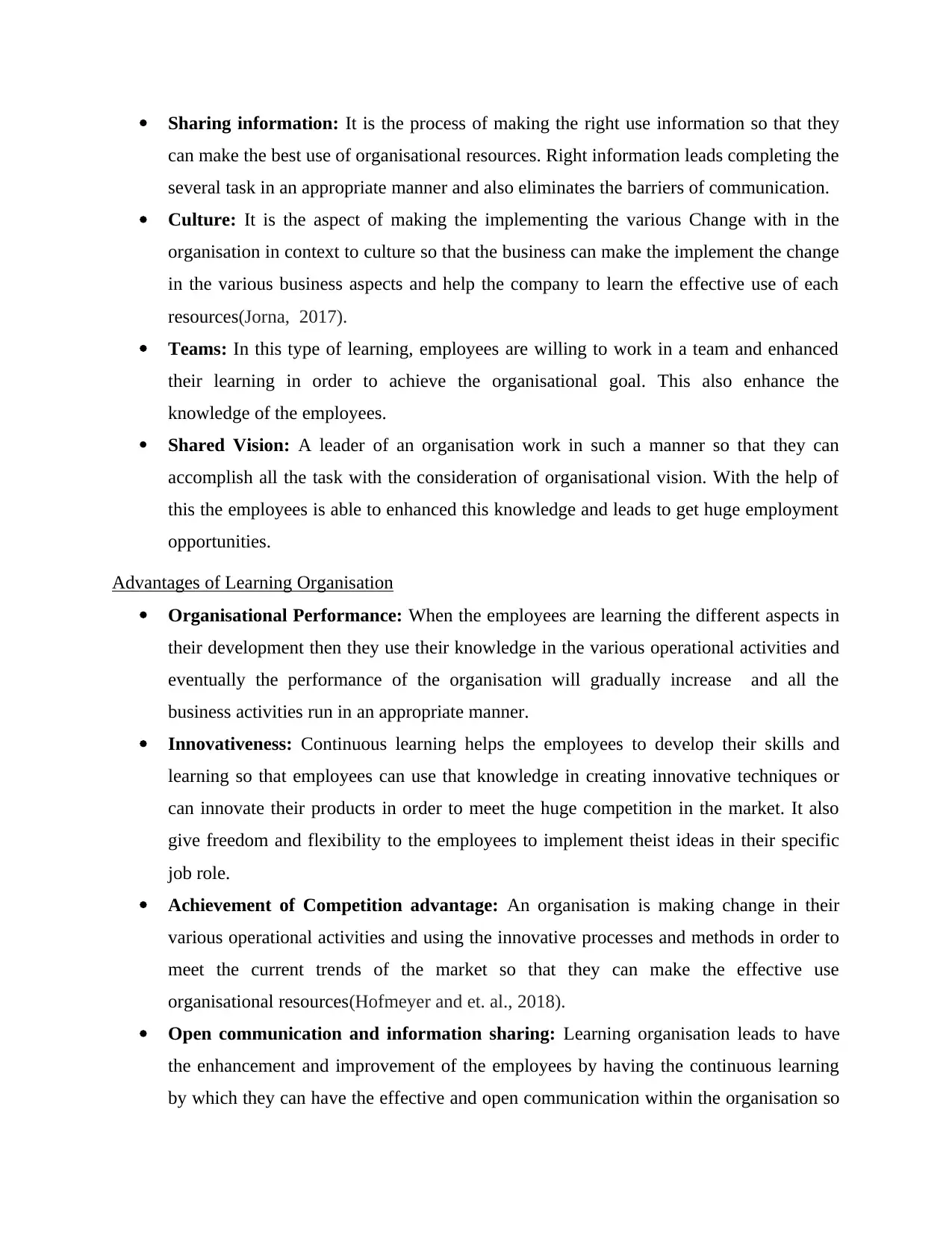
Sharing information: It is the process of making the right use information so that they
can make the best use of organisational resources. Right information leads completing the
several task in an appropriate manner and also eliminates the barriers of communication.
Culture: It is the aspect of making the implementing the various Change with in the
organisation in context to culture so that the business can make the implement the change
in the various business aspects and help the company to learn the effective use of each
resources(Jorna, 2017).
Teams: In this type of learning, employees are willing to work in a team and enhanced
their learning in order to achieve the organisational goal. This also enhance the
knowledge of the employees.
Shared Vision: A leader of an organisation work in such a manner so that they can
accomplish all the task with the consideration of organisational vision. With the help of
this the employees is able to enhanced this knowledge and leads to get huge employment
opportunities.
Advantages of Learning Organisation
Organisational Performance: When the employees are learning the different aspects in
their development then they use their knowledge in the various operational activities and
eventually the performance of the organisation will gradually increase and all the
business activities run in an appropriate manner.
Innovativeness: Continuous learning helps the employees to develop their skills and
learning so that employees can use that knowledge in creating innovative techniques or
can innovate their products in order to meet the huge competition in the market. It also
give freedom and flexibility to the employees to implement theist ideas in their specific
job role.
Achievement of Competition advantage: An organisation is making change in their
various operational activities and using the innovative processes and methods in order to
meet the current trends of the market so that they can make the effective use
organisational resources(Hofmeyer and et. al., 2018).
Open communication and information sharing: Learning organisation leads to have
the enhancement and improvement of the employees by having the continuous learning
by which they can have the effective and open communication within the organisation so
can make the best use of organisational resources. Right information leads completing the
several task in an appropriate manner and also eliminates the barriers of communication.
Culture: It is the aspect of making the implementing the various Change with in the
organisation in context to culture so that the business can make the implement the change
in the various business aspects and help the company to learn the effective use of each
resources(Jorna, 2017).
Teams: In this type of learning, employees are willing to work in a team and enhanced
their learning in order to achieve the organisational goal. This also enhance the
knowledge of the employees.
Shared Vision: A leader of an organisation work in such a manner so that they can
accomplish all the task with the consideration of organisational vision. With the help of
this the employees is able to enhanced this knowledge and leads to get huge employment
opportunities.
Advantages of Learning Organisation
Organisational Performance: When the employees are learning the different aspects in
their development then they use their knowledge in the various operational activities and
eventually the performance of the organisation will gradually increase and all the
business activities run in an appropriate manner.
Innovativeness: Continuous learning helps the employees to develop their skills and
learning so that employees can use that knowledge in creating innovative techniques or
can innovate their products in order to meet the huge competition in the market. It also
give freedom and flexibility to the employees to implement theist ideas in their specific
job role.
Achievement of Competition advantage: An organisation is making change in their
various operational activities and using the innovative processes and methods in order to
meet the current trends of the market so that they can make the effective use
organisational resources(Hofmeyer and et. al., 2018).
Open communication and information sharing: Learning organisation leads to have
the enhancement and improvement of the employees by having the continuous learning
by which they can have the effective and open communication within the organisation so
Paraphrase This Document
Need a fresh take? Get an instant paraphrase of this document with our AI Paraphraser

that they can share their knowledge to others which leads to increase the overall
performance of the business.
Rapid change adaptability: When the employees is using the advanced and innovative
method in their assigned task, It encourage the workforce in order to adopt the change so
that an organisation can meet the competitive advantage.
Disadvantages of learning organisation
Complicated implementation process and time consuming: When the employees
within the organization is adopting and learning the various innovative processes and
methods then it will be tough to implement the new techniques and eventually the
performance of an organisation decreases(Gupta and Wales, 2017).
Breaking of current rules of the company: Change leads to framing of new rules and
regulation in the operational activities and it create hurdles and conflicts in the workplace
in order to implement the innovative techniques.
Ignorance of power difference: In learning organisation, all the employees is being
treated equally as they are having the skills and knowledge in order to implement the
change within the organisation. It affects the power distribution among the workforce and
all the employees will leads to have the changing techniques with the learning of
employees.
Participation fear in decision making of the employees: continuous learning leads to
have the enhancement of the various business activities and it create the problem in
selecting the deserving candidate who is having the required knowledge so that they can
attain the organizational goal.
Relationship between Organisational Learning and Learning Organisation
Learning is the process which play an significant role in the enhancement and
improvement of the individual in order to increase their overall performance. There are various
challenges which is faced by the company, sometimes they face the quick decision-making or the
launch of the new products so that learning help the individual to overcome all the challenges in
order to perform various task in an appropriate manner. All the factors will help in gaining
knowledge within the enterprises Both the organisational learning and learning organisation is
interrelated as they both focus on the learning and the enhancement of their skills in order to
performance of the business.
Rapid change adaptability: When the employees is using the advanced and innovative
method in their assigned task, It encourage the workforce in order to adopt the change so
that an organisation can meet the competitive advantage.
Disadvantages of learning organisation
Complicated implementation process and time consuming: When the employees
within the organization is adopting and learning the various innovative processes and
methods then it will be tough to implement the new techniques and eventually the
performance of an organisation decreases(Gupta and Wales, 2017).
Breaking of current rules of the company: Change leads to framing of new rules and
regulation in the operational activities and it create hurdles and conflicts in the workplace
in order to implement the innovative techniques.
Ignorance of power difference: In learning organisation, all the employees is being
treated equally as they are having the skills and knowledge in order to implement the
change within the organisation. It affects the power distribution among the workforce and
all the employees will leads to have the changing techniques with the learning of
employees.
Participation fear in decision making of the employees: continuous learning leads to
have the enhancement of the various business activities and it create the problem in
selecting the deserving candidate who is having the required knowledge so that they can
attain the organizational goal.
Relationship between Organisational Learning and Learning Organisation
Learning is the process which play an significant role in the enhancement and
improvement of the individual in order to increase their overall performance. There are various
challenges which is faced by the company, sometimes they face the quick decision-making or the
launch of the new products so that learning help the individual to overcome all the challenges in
order to perform various task in an appropriate manner. All the factors will help in gaining
knowledge within the enterprises Both the organisational learning and learning organisation is
interrelated as they both focus on the learning and the enhancement of their skills in order to
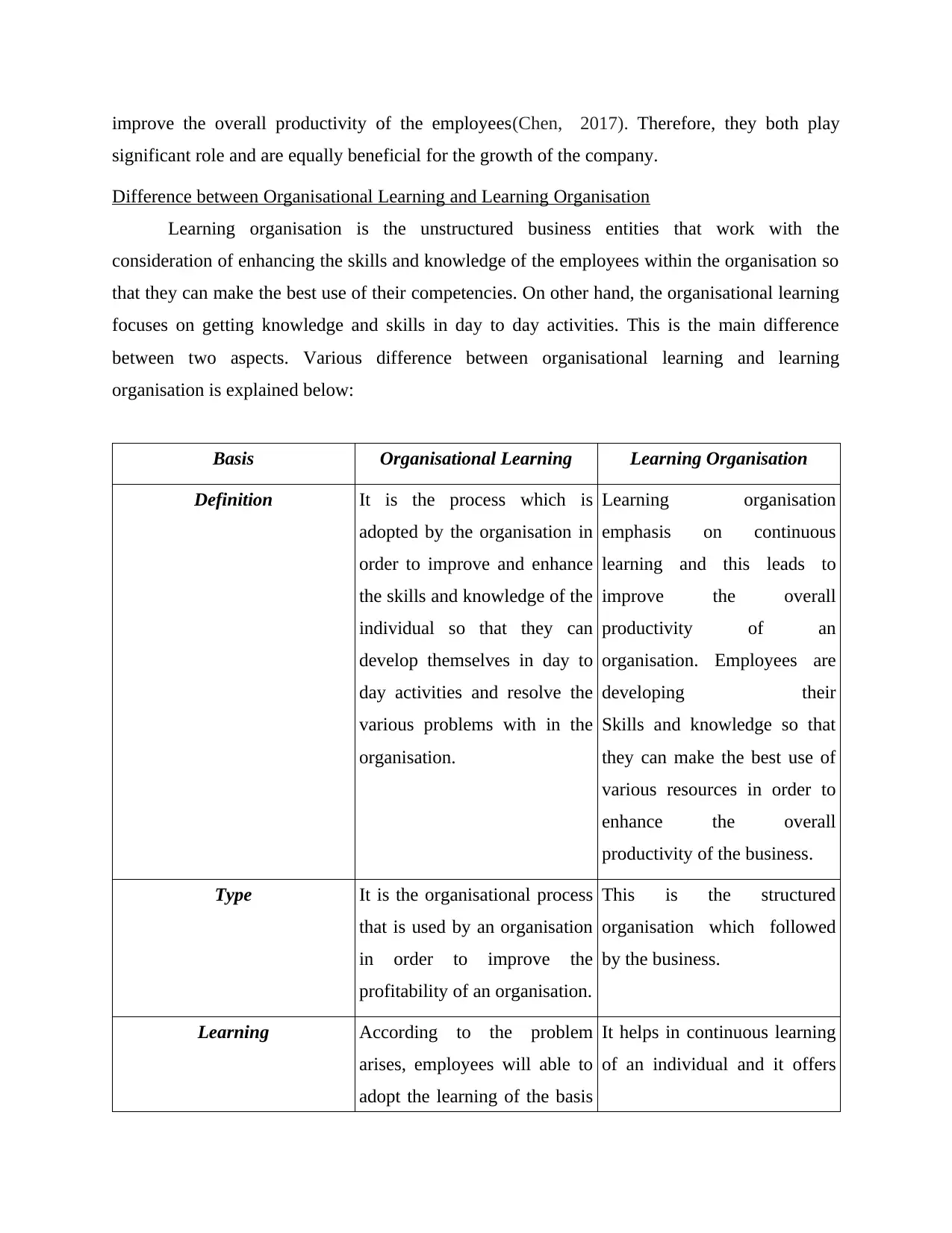
improve the overall productivity of the employees(Chen, 2017). Therefore, they both play
significant role and are equally beneficial for the growth of the company.
Difference between Organisational Learning and Learning Organisation
Learning organisation is the unstructured business entities that work with the
consideration of enhancing the skills and knowledge of the employees within the organisation so
that they can make the best use of their competencies. On other hand, the organisational learning
focuses on getting knowledge and skills in day to day activities. This is the main difference
between two aspects. Various difference between organisational learning and learning
organisation is explained below:
Basis Organisational Learning Learning Organisation
Definition It is the process which is
adopted by the organisation in
order to improve and enhance
the skills and knowledge of the
individual so that they can
develop themselves in day to
day activities and resolve the
various problems with in the
organisation.
Learning organisation
emphasis on continuous
learning and this leads to
improve the overall
productivity of an
organisation. Employees are
developing their
Skills and knowledge so that
they can make the best use of
various resources in order to
enhance the overall
productivity of the business.
Type It is the organisational process
that is used by an organisation
in order to improve the
profitability of an organisation.
This is the structured
organisation which followed
by the business.
Learning According to the problem
arises, employees will able to
adopt the learning of the basis
It helps in continuous learning
of an individual and it offers
significant role and are equally beneficial for the growth of the company.
Difference between Organisational Learning and Learning Organisation
Learning organisation is the unstructured business entities that work with the
consideration of enhancing the skills and knowledge of the employees within the organisation so
that they can make the best use of their competencies. On other hand, the organisational learning
focuses on getting knowledge and skills in day to day activities. This is the main difference
between two aspects. Various difference between organisational learning and learning
organisation is explained below:
Basis Organisational Learning Learning Organisation
Definition It is the process which is
adopted by the organisation in
order to improve and enhance
the skills and knowledge of the
individual so that they can
develop themselves in day to
day activities and resolve the
various problems with in the
organisation.
Learning organisation
emphasis on continuous
learning and this leads to
improve the overall
productivity of an
organisation. Employees are
developing their
Skills and knowledge so that
they can make the best use of
various resources in order to
enhance the overall
productivity of the business.
Type It is the organisational process
that is used by an organisation
in order to improve the
profitability of an organisation.
This is the structured
organisation which followed
by the business.
Learning According to the problem
arises, employees will able to
adopt the learning of the basis
It helps in continuous learning
of an individual and it offers
⊘ This is a preview!⊘
Do you want full access?
Subscribe today to unlock all pages.

Trusted by 1+ million students worldwide
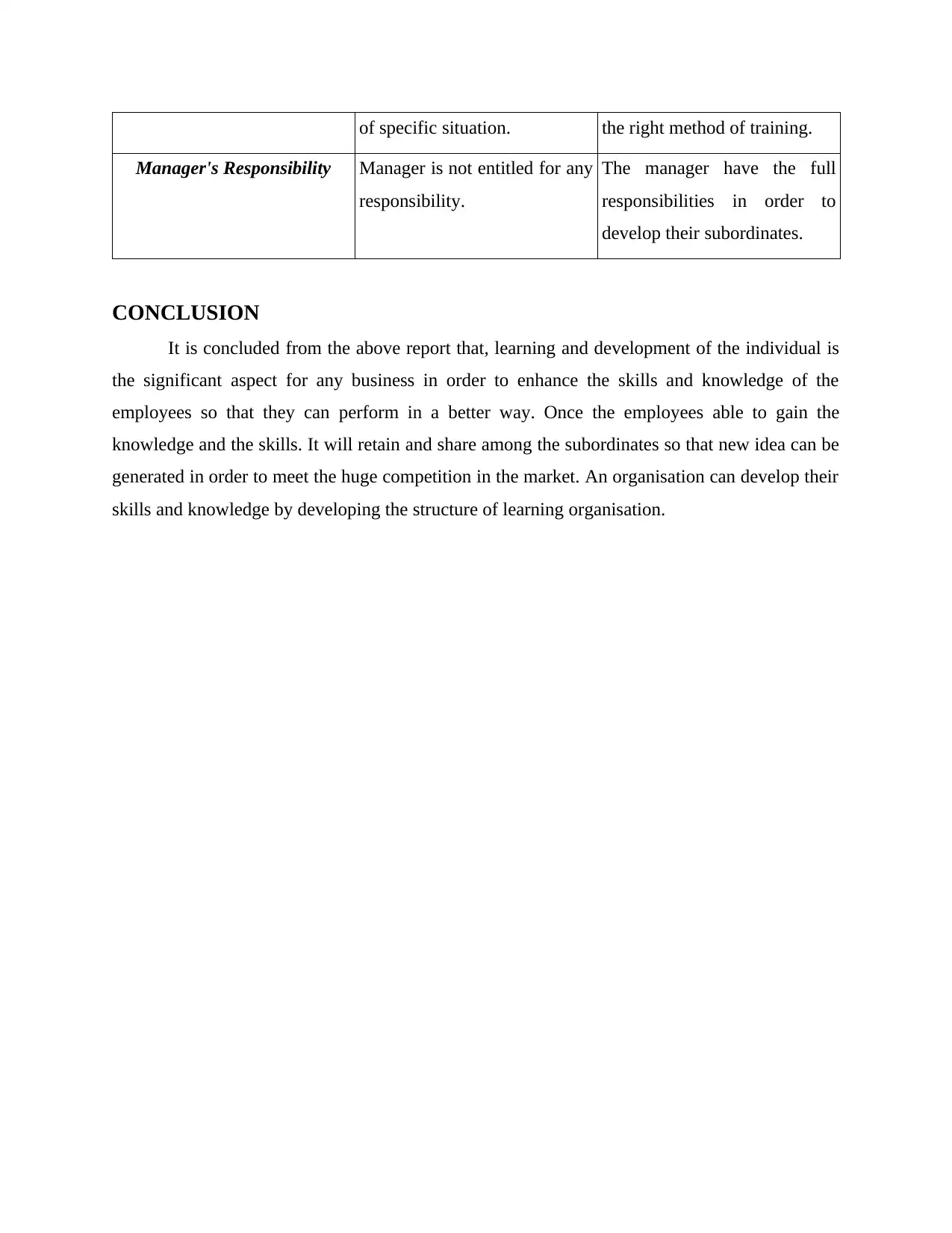
of specific situation. the right method of training.
Manager's Responsibility Manager is not entitled for any
responsibility.
The manager have the full
responsibilities in order to
develop their subordinates.
CONCLUSION
It is concluded from the above report that, learning and development of the individual is
the significant aspect for any business in order to enhance the skills and knowledge of the
employees so that they can perform in a better way. Once the employees able to gain the
knowledge and the skills. It will retain and share among the subordinates so that new idea can be
generated in order to meet the huge competition in the market. An organisation can develop their
skills and knowledge by developing the structure of learning organisation.
Manager's Responsibility Manager is not entitled for any
responsibility.
The manager have the full
responsibilities in order to
develop their subordinates.
CONCLUSION
It is concluded from the above report that, learning and development of the individual is
the significant aspect for any business in order to enhance the skills and knowledge of the
employees so that they can perform in a better way. Once the employees able to gain the
knowledge and the skills. It will retain and share among the subordinates so that new idea can be
generated in order to meet the huge competition in the market. An organisation can develop their
skills and knowledge by developing the structure of learning organisation.
Paraphrase This Document
Need a fresh take? Get an instant paraphrase of this document with our AI Paraphraser

REFERENCES
Books and Journals
Chen, I.S., 2017. Computer self-efficacy, learning performance, and the mediating role of
learning engagement. Computers in Human Behavior, 72, pp.362-370.
Gupta, V.K. and Wales, W.J., 2017. Assessing organisational performance within
entrepreneurial orientation research: where have we been and where can we go from
here?. The Journal of Entrepreneurship, 26(1), pp.51-76.
Hofmeyer, A. and et. al., 2018. Teaching compassionate care to nursing students in a digital
learning and teaching environment. Collegian, 25(3), pp.307-312.
Jorna, R. ed., 2017. Sustainable innovation: The organisational, human and knowledge
dimension. Routledge.
Shakhovska, N., Vysotska, V. and Chyrun, L., 2017. Intelligent systems design of distance
learning realization for modern youth promotion and involvement in independent
scientific researches. In Advances in Intelligent Systems and Computing (pp. 175-198).
Springer, Cham.
Shao, Z., Feng, Y. and Wang, T., 2017. Charismatic leadership and tacit knowledge sharing in
the context of enterprise systems learning: the mediating effect of psychological safety
climate and intrinsic motivation. Behaviour & Information Technology, 36(2), pp.194-
208.
Sharma, S.K. And et. al., 2017. Structural equation model (SEM)-neural network (NN) model
for predicting quality determinants of e-learning management systems. Behaviour &
Information Technology, 36(10), pp.1053-1066.
Shi, J. and et. al., 2018. Super-resolution reconstruction of MR image with a novel residual
learning network algorithm. Physics in Medicine & Biology, 63(8), p.085011.
Smith, R. and Starmer, L., 2017. Building adaptive expertise: Professional learning that works
with teachers, not on them. Australian Educational Leader, 39(4), pp.22-25.
Veelen, R.V., Sleegers, P.J. and Endedijk, M.D., 2017. Professional learning among school
leaders in secondary education: The impact of personal and work context
factors. Educational administration quarterly, 53(3), pp.365-408.
Books and Journals
Chen, I.S., 2017. Computer self-efficacy, learning performance, and the mediating role of
learning engagement. Computers in Human Behavior, 72, pp.362-370.
Gupta, V.K. and Wales, W.J., 2017. Assessing organisational performance within
entrepreneurial orientation research: where have we been and where can we go from
here?. The Journal of Entrepreneurship, 26(1), pp.51-76.
Hofmeyer, A. and et. al., 2018. Teaching compassionate care to nursing students in a digital
learning and teaching environment. Collegian, 25(3), pp.307-312.
Jorna, R. ed., 2017. Sustainable innovation: The organisational, human and knowledge
dimension. Routledge.
Shakhovska, N., Vysotska, V. and Chyrun, L., 2017. Intelligent systems design of distance
learning realization for modern youth promotion and involvement in independent
scientific researches. In Advances in Intelligent Systems and Computing (pp. 175-198).
Springer, Cham.
Shao, Z., Feng, Y. and Wang, T., 2017. Charismatic leadership and tacit knowledge sharing in
the context of enterprise systems learning: the mediating effect of psychological safety
climate and intrinsic motivation. Behaviour & Information Technology, 36(2), pp.194-
208.
Sharma, S.K. And et. al., 2017. Structural equation model (SEM)-neural network (NN) model
for predicting quality determinants of e-learning management systems. Behaviour &
Information Technology, 36(10), pp.1053-1066.
Shi, J. and et. al., 2018. Super-resolution reconstruction of MR image with a novel residual
learning network algorithm. Physics in Medicine & Biology, 63(8), p.085011.
Smith, R. and Starmer, L., 2017. Building adaptive expertise: Professional learning that works
with teachers, not on them. Australian Educational Leader, 39(4), pp.22-25.
Veelen, R.V., Sleegers, P.J. and Endedijk, M.D., 2017. Professional learning among school
leaders in secondary education: The impact of personal and work context
factors. Educational administration quarterly, 53(3), pp.365-408.
1 out of 11
Related Documents
Your All-in-One AI-Powered Toolkit for Academic Success.
+13062052269
info@desklib.com
Available 24*7 on WhatsApp / Email
![[object Object]](/_next/static/media/star-bottom.7253800d.svg)
Unlock your academic potential
Copyright © 2020–2025 A2Z Services. All Rights Reserved. Developed and managed by ZUCOL.




